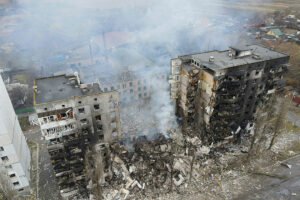ADDITIONAL sanctions on Russia if it escalates the Ukraine war could lead to higher pump prices paid by consumers in Asia, with the crude oil price benchmark for the region possibly rising as high as $200 per barrel, the Asian Development Bank (ADB) said.
The projection was contained in a report, the Asian Development Outlook 2022 Supplement.
The bank said the main driver for prices will be the supply-demand gap of about 3.5 to 7 million barrels a day, as suppliers fall short of their targets amid supply chain disruptions, leveraged positions, and rising costs, the ADB said.
Rizal Commercial Banking Corp. (RCBC) Chief Economist Michael L. Ricafort said $200 crude is likely in the event of “further sanctions on Russia, and if Russia retaliates using oil (and) energy supplies as leverage.”
“That’s beyond our control. Rich countries can do that anytime in anyway they want. It›s really possible given that they are taking the economic approach to stop the war,” said John Paolo R. Rivera, an economist at the Asian Institute of Management.
Oil prices peaked at $140 per barrel ($180 in today’s money) in June 2008, absent of any geopolitical issues, the ADB added.
The Philippines is highly dependent on oil imports, making its economy sensitive to global oil price swings.
“While I believe we have supply, we might not be able to manage prices as we have seen in previous months,” Mr. Rivera said in a Viber message.
The ADB said its scenarios for developing Asia include, on the optimistic end, a short-term shock in the remaining months of the year, in which gross domestic product growth is unaffected and inflation hits 5.1% before easing to 2.4% in 2023.
Last week, the ADB downgraded its 2022 growth forecast for developing Asia to 4.6% from the 5.2% projection in April.
It also raised its inflation forecast for this year to 4.2% and next year to 3.5%.
“The more plausible scenario is the war escalating in conjunction with a $200 per barrel price shock (which) will set off significant secondary effects. One possibility is an increase in inflation expectations that requires additional monetary policy tightening, which will also result in falling consumer confidence and business sentiment,” ADB said.
In such a case, the region will post downgraded growth of 3.2% in 2022 and 4.5% in 2023. The latter is lower than the 5.2% forecast for that year.
At the same time, inflation will increase to 5.8% and 5.3% in 2022 and 2023 respectively.
The severe scenario involves global financial turmoil in 2023 driven by expectations of heightened inflation and monetary policy tightening, with developing Asia growing by only 2.2% and several economies contracting.
Nonetheless, RCBC’s Mr. Ricafort said that global oil prices have already declined to their lowest levels in about four months, with Nymex crude oil falling to $95 from its $130 peak during the Russia-Ukraine conflict.
“Some COVID-19 lockdowns in China, which is the world’s second largest economy, also led to the recent declines in the prices of global crude oil and other major global commodities,” he said in a Viber message.
While the ADB projects elevated oil prices relative to prices last year, the possibility of $200 per barrel remains low after the European Union decided to phase out Russian oil imports gradually.
“Doing this rather than abruptly ending imports will allow for an orderly transition to alternative supplies and keep prices more stable and affordable for consumers,” the ADB said.
“Further reduction of reliance on imported crude oil (and) petroleum products would (be) among the structural solutions, by increasing the shift to more renewable power sources such as solar, wind, hydro, (and) geothermal, as well as accelerating the shift to electric vehicles,” Mr. Ricafort said.
“Conservation measures would also help reduce demand for imported crude oil (and) petroleum products,” he added.
The Philippine government’s economic assumptions are for Dubai crude — the price benchmark for Asia — to average $90-$110 per barrel this year, $80-100 per barrel in 2023, and $70-90 per barrel from 2024 to 2028. — Diego Gabriel C. Robles
